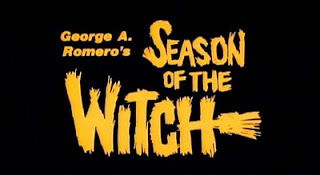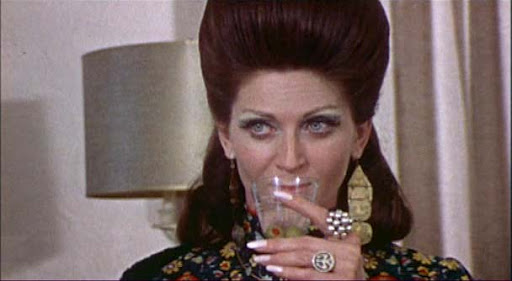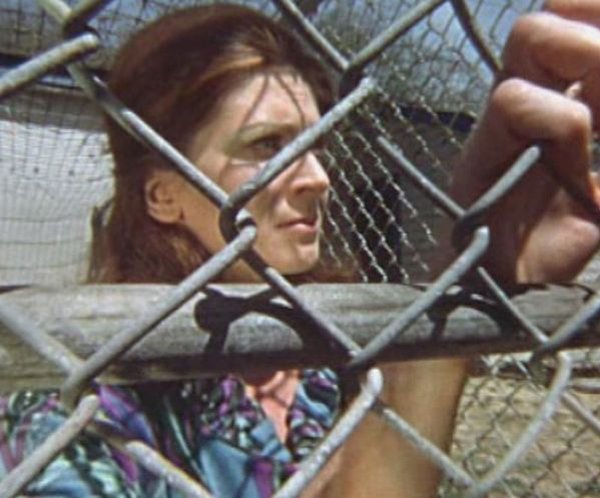
As Phil comes closer to having reviewed all of George Romero’s films this month, he looks at a sin of the Horror Movie Relocation Program, and wishes he would have been able to arrange an interview with Jan White.
Constant readers of my reviews know about the Horror Movie Relocation Program. I use the term when reviewing a flick that has been released under more than one title, a common process back in the late 1970 and early 1980s. One reason for the practice was that when distributors thought a title wasn’t exploitative enough, they’d slap on one that was more lurid. It’s almost impossible now to believe this would ever happen to a George Romero film, especially in the short term after NIGHT OF THE LIVING DEAD. But happen it did to JACK’S WIFE, which became HUNGRY WIVES, and finally SEASON OF THE WITCH. It’s the greatest sin ever committed in the Program.
Because JACK’S WIFE sums up the film perfectly. Joan Mitchell is a meek woman of the early ‘70s, the type who stayed home quietly while other women were at Woodstock or burning their bras. Nobody respects her. Her sometimes violent husband Jack doesn’t listen to a word she says, and occasionally slaps her when he thinks she’s out of line; her daughter doesn’t understand her; her best friend encapsulates the entire film when she snipes, “Oh how in the hell can someone have so many opinions without ever having done anything?” Sadly, Joan is a shadow of a real human being, who exists only in her relationship to others. People don’t recognize her as Joan Mitchell. No, she’s Jack’s wife.
It’s pathetic, until two events change Joan’s life. First, she and a friend go to a witch to have the friend’s cards read. Joan’s along just for the ride, but she ends up taking greater interest in witchcraft than the friend. The second happens when they return to Joan’s house. Daughter Nikki and her hip university boyfriend Gregg are hanging out at the house, and he gets the friend hammered. When he plays a prank by getting her to try fake weed, Joan is appalled by his behavior. When he tells her he’s not looking for an affair, she’s shocked and angered. But his brutal honesty appeals to her, as does the witchcraft. Stepping into the forbidden territories of witchery and an infidelity embolden her to become her own woman, with dire consequences.

For those who think Romero waited until Savini’s NIGHT OF THE LIVING DEAD remake to apologize for Barbra, he actually started saying sorry in 1973 with JACK’S WIFE. In the opening dream sequence, Joan is a kept woman. Her husband walks her on a leash, and locks her in a cage. The dream sequences are so heavy handed, especially in the opening scene, where branches smack Joan in the face. It takes no genius to figure Romero’s smacking the audience in the face with his symbolism. He’s never been subtle with his metaphors, but this is ludicrous.
It’s blunt, but it does sell the message. In her own mind, Joan is a victim through her own passivity. The witchcraft is bogus (as everybody but Joan acknowledges), but it’s a means to an end, as she desperately clutches it as empowerment. The affair serves the same purpose, as the older woman has sex with the young man who was loudly having sex with her daughter a few nights ago. She frees herself of all social restrictions, and the inherent hang ups that come with them. The film’s greatest asset is Jan White’s performance as Joan. She portrays her insecurities and bewilderment pitch perfectly, capturing the confusion and profound sadness. It’s not a great performance, but it’s realistic, and anchors the film.

The big question I have at the film’s end is, Is Joan really liberated now? A tragic event seems to set her free, but Romero intercuts scenes of her at an initiation ceremony, where she’s led by a leash. For me, the message is that she’s sold one cage for another, and will never be herself if she allows others to lead her. Maybe Romero hadn’t stepped his females so far out of Barbra’s shadow after all.
As for his male star, I like Ray Laine. He plays pretty much the same freewheeling hippie he portrayed in THERE’S ALWAYS VANILLA. Both his characters are so attractive that I can look past their sometimes unkind behavior because, they’re honest. Gregg is a reality check for Joan, and calls it like he sees it.
JACK’S WIFE is not a great movie. It would count as a minor Romero effort even had it been some huge box office draw. But poor distribution made sure nobody saw this film when it came out in limited release, which happened after distributors started screwing around with the title. JACK’S WIFE became HUNGRY WIVES. This is criminal. The trailer for that title makes it look like it’s a film about a bunch of daring women on the edge, capable of doing anything. It’s a more lurid title, but it also falsely sells the film. Romero had made a commentary on women’s lib, not BEYOND THE VALLEY OF THE DOLLS. Still later, it became SEASON OF THE WITCH, renamed after the Donovan song he’d placed in it. That title is way too cheeky, even if it hadn’t been recently re-appropriated as the name of a crappy Nic Cage movie. The Horror Movie Relocation Program mocked a George Romero film, and that’s unforgivable.
Anchor Bay doesn’t need to be forgiven for its package of extras. There’s a great interview with Jan White, as she shares her recollections about the film. I met her a few years back, and was supposed to interview her myself, but those plans never came to fruition. Hopefully, I’ll one day interview her for Death Ensemble. There’s also the episode of cable TV’s The Directors, an hour long retrospective on Romero’s career, which oddly barely mentions SEASON OF THE WITCH. I’ll review that separately. The opening title sequences show just how much difference a name can make on a film. Oh, and flip the disc over and THERE’S ALWAYS VANILLA is an extra. Better yet, don’t. If you’re tempted, watch Romero discuss the two films, and how he’d like to remake JACK’S WIFE.
What’s in a name, Shakespeare once asked. Everything in this case. JACK’S WIFE is a blip on Romero’s career as a director, but it’s a solid early effort that deserves the two word moniker that sum it up so tidily. I think Barbra would agree.
-Phil Fasso